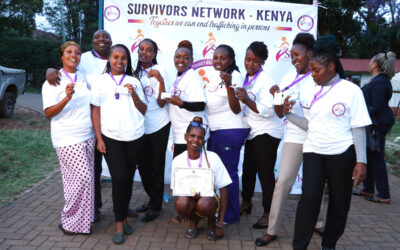Today is an important date in the Catholic calendar. Pope Francis has proclaimed Feb. 8 the “International Day of Prayer and Awareness on Human Trafficking.”
The date commemorates the life of St. Josephine Bakhita, a Sudanese woman who was kidnapped into slavery in the 1800s, rescued by an Italian diplomat, welcomed by a convent to become a nun, and canonized by the pope as a saint.
“Human trafficking is a crime against humanity,” says Pope Francis. “It’s a disgrace,” he says, that people are treated “as objects, deceived, raped, often sold many times for different purposes and, in the end, killed or, in any case, physically and mentally damaged, ending up thrown away and abandoned.”
You can honor St. Bakhita in three concrete ways:
- One: Read about St. Bakhita’s remarkable journey in life on the Vatican website and the FTS blog. Share it!
- Two: See a proposed prayer for today from the Archdiocese of Vancouver. Share it!
- Three: Join the U.S. Catholic Sisters Against Human Trafficking’s congressional call-in campaign today. They want to generate hundreds of calls to Congress to pass the Business Supply Chain Transparency on Trafficking and Slavery Act of 2015. Here’s how to do it, and what you can say:
Call the Congressional switchboard 202-224-3121 where you will be directed to the offices of your members of Congress. Please call both senators and your representative. Ask your members to co-sponsor the Business Supply Chain Transparency on Trafficking and Slavery Act of 2015, and if they’ve already become a co-sponsor of H.R. 3226 or S. 1968, please say “Thank You!”
Suggested Script:
I am _________________, a concerned citizen and a constituent. Could I speak with the staffer who handles legislation about human trafficking please?
I am calling to ask Senator/Representative _________ to co-sponsor S. 1968/H.R. 3226, the Business Supply Chain Transparency on Trafficking and Slavery Act of 2015. Human trafficking and the use of slave labor is of grave concern to me. As a consumer I care about how the products I purchase were produced.
I’m asking that the Senator/Representative to become a co-sponsor of this legislation because:
Consumers should be able to make informed decisions about what they purchase. Congress can help hold corporations accountable for any forced or child labor in their production. Businesses should be required to publicly disclose their efforts to eliminate human trafficking and child labor in their business operations and supply chains.
Can I count on the Senator/Representative to co-sponsor S.1968/H.R. 3226? Thank you!
Thanks for reflecting today on the reach and impact of modern slavery, spreading the word, and acting to end it forever!



